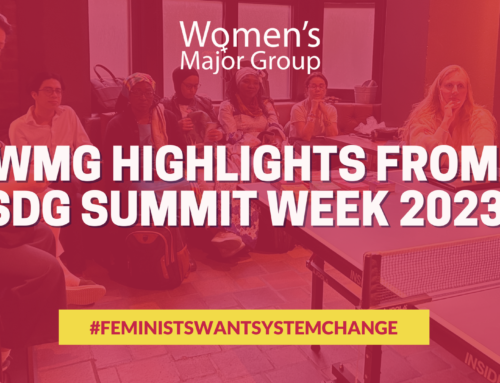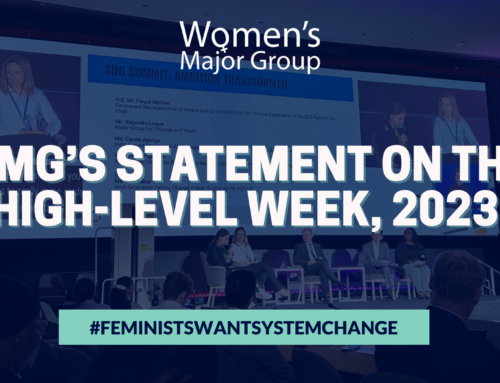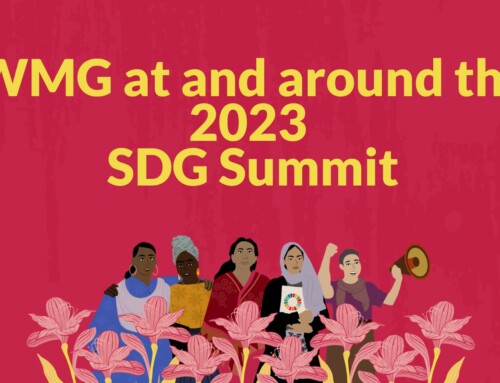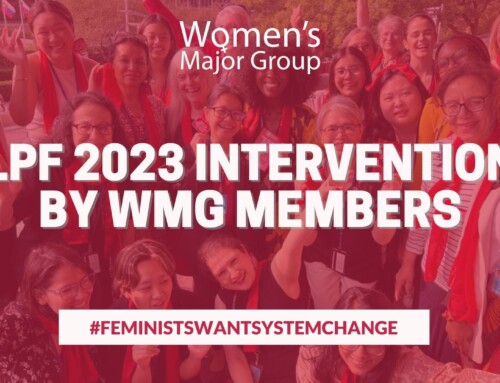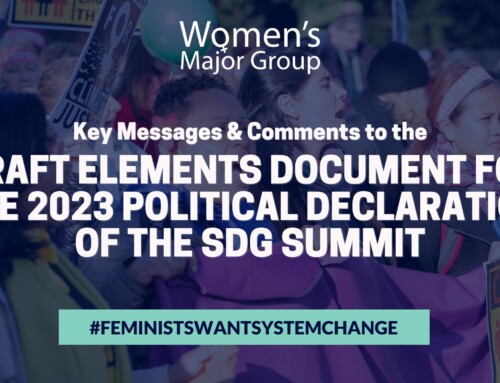Asia Pacific Women Constituency Inputs for the Chair Statement 2020
We are not on track in achieving Sustainable Development Goals. Instead, we have seen new crises: climate crises that threaten our survival, public health crises especially COVID19, and wealth inequality crises that have worsened worldwide. Simultaneously, our democratic system is also under crisis, with more right wing and fascist leaders using populist messaging and manipulating data to be elected, and using attacks on women’s rights as a method to establish their power. The 2030 Agenda and the Beijing Declaration and Platform for Action can only be achieved through a drastic shift from neoliberal capitalism that devalues women’s work and prioritising corporate interests, as well as dismantling patriarchy, caste system, feudalism, communalism, authoritarianism and other social norms that discriminates women, girls and marginalised groups. These factors limit the rights of women and girls to self-determination, choice of profession, bodily autonomy, economic independence, health including sexual and reproductive health, and freedom from violence.
The six entry points identified have common necessities: a grounding in human rights, including women’s human rights; governments should restore the primacy of human rights in fulfilling their national, regional and international obligations, including: 1) reevaluation of economic, financial, trade and investment policies – reform of economic policy would also need a reckoning of the neoliberal economic order, which has exacerbated inequality and prioritised corporate power and profit over human and environmental rights. 2) provide universal access, across all background characteristics, social exclusion and vulnerability, to well being and capabilities including access to social protection systems, food sovereignty, universal access to health care including sexual and reproductive health and rights and quality and inclusive education, water and sanitation and other public services in a just equitable, gender equal world with full dignity, respect, privacy and confidentiality for all free from discrimination, stigma and violence. 3) realise just and equitable transition, away from a consumption-based, extractive and exploitative economy to just and sustainable economies based on the needs of communities.This requires ending fossil fuel energy dependence, as well as supporting sustainable food systems that are grounded in food sovereignty and support smallholder farming, agroecology and traditional knowledge. The reliance on the private sector and external funding for public services is alarming. It is vital to have stringent regulatory mechanisms to prevent corruption and capitalization of public resources and commodities.
Simultaneously, the High Level Political Forum and systems of accountability and measure of progress on sustainable development also need to be evaluated and reformed. The thematic discussions at HLPF, as well as regional and subregional forums need to shift, not only discussing progress but also on trade-offs, bottlenecks and systemic and structural challenges that hinder the progress. VNR sessions should not be an opportunity for member states to showcase a feelgood tourist video of how much has been achieved, nor to present a good image for states that are faring poorly on realisation of fundamental freedoms and quality of democracy. The link between national, subregional, regional and global level processes need to be strengthened. Regional forums can be used to discuss transboundary issues and regional cooperation, as well as to present interim regional VNR that can strengthen inputs from civil societies.
In 2020, as we move towards the first five-year review of the 2030 Agenda, we are experiencing greater inequalities than ever before, and with the Covid-19 pandemic, we are bound to go several steps backwards. We don’t want quick fixes, but a total paradigm shift.. With irreversible change at our doorstep, the “new normal” that we create must use 2020 as the year to radically transform our world and take action to enact systemic change, and realise a gender equal world and Development Justice
Answers for the questionnaire
- Where have we progressed the most? (max 250 words) – currently 231 words
Asia and the Pacific region is home to 60% of the world’s population with over half of the people being women, it is appalling that the gender equality goal in the region is making disastrously slow progress. Progress around the Agenda 2030 SDGs , when taking into account women, has been uneven , with some goals showing progress and some showing negative trends.
We need to recognise that women and girls hold the key for sustainable development. Beijing+25 Review shows that strides have been made in terms of laws and policies to preventing VAW, promoting gender equality and women’s rights, the decline in child Marriage in South Asia, promotion of political particiption and improvement of gender equality in national governance and establishment of national women focussed commissions/machnieries. The increased levels of female literacy and decreased gender parity in primary school enrolments, along with an increase in the number of girls studying traditionally male-dominated subjects is certainly a long-term gain for the region. Reduction in the maternal mortality ratio contributing to women’s and girls’ health, particularly maternal health, through increased skilled birth attendants and maternity facilities in hospitals is another landmark achievement in the region. However, the progress is too slow and uneven, and is marked by disparities within countries and across countries on the basis of intersectional barriers the women face and going against the principle of leaving no one behind
.
- What are the most important challenges in seeking to accelerate transformations? (current 239 words)
Current neoliberal capitalism relies on the systematic discrimination and degradation of women to generate growth. It perpetuates devaluation of women’s work , increasing vulnerability among informal, migrants and domestic women workers. Patriarchy, caste system, feudalism, communalism, institutionalized racism, majority authoritarinaism, and the prevalence of social norms and masculine attitudes , prevent the continued education of girls, promote women’s unpaid care work, early and forced child marriage and female genital mutilation and other harmful practices. These factors limit the rights of women and girls to self-determination, choice of profession, bodily autonomy ,economic independence, health including sexual and reproductive health, and freedom from violence.
Unjust trade and investment agreements lead to deregulation and liberalisation; privileging of investors’ rights over human rights via ISDS. Land and resource grabbing as well as militarism and conflicts resulting in increased attacks on women environmental defenders – including indigenous women, as well as detention and displacement.
Inadequate technical, political and financial resources for gender equality-related policies is contributing to sexual and gender-based violence, loss of economic security, higher infant and maternal mortality, and extrajudicial and summary executions.
Privatisation of public services as well public private partnership (PPP) further denies women’s rights. This situation aggravates out of pocket health expenditure, which is a high 64% in South Asia, and primarily affects access for women and marginalized groups, such as women living with HIV.
Lack of sex-disaggregated data, gender indicators/statistics and state accountability structures for practical implementation of adopted laws continues to be a major challenge.
- On each entry point, what are the actions that can be taken to address challenges and accelerate implementation of the SDGs in Asia and the Pacific?
Entry Point 1: Human Wellbeing and Capabilities (current: 194 words)
Provide universal access, across all background chracteristics, social exclusuon and vulnerability, to well being and capabilities including access to social protection systems including universal basic income, food security and sovereignty, universal access to health care including sexual and reproductive health and rights and quality and inclusive education, water and sanitation, in a just equitable, gender equal world with full dignity, respect, privacy and confidentiality for all free from discrimination, stigma and violence .
Ensure the universal attainment of gender equality, through gender mainstreamed clear financing strategies, and resource the SDG implementation, towards full realization of women’s and girls’ human rights; revoke all gender discriminatory legislation, policies and practices that contribute to gender inequalities. Provide access to justice, and ensure effective mechanisms to address violations of human rights, address all forms of sexual and gender-based violence and violence against women and girls in all their diversity and end impunity for sexual and gender-based violence.
Ensure equal access to, ownership, inheritance, and control of, productive assets and resources, including land, credit, and natural resources management. Reduce and redistribute the burden of unpaid domestic and care work through shared responsibility by states, private sector, communities, women and men.
Entry point 2 – Sustainable and just economies (current 248)
Sustainable and just economies can only be achieved through a drastic system change that rethinks the notion of growth and assumptions of gender neutrality. Challenging gender inequality therefore requires directly challenging economic policies, institutions and accounting that have entrenched social inequalities. Recommendations:
- Policy coherence for human rights – governments should restore the primacy of human rights in fulfilling their national, regional and international obligations. Compulsory ex-ante, periodic and ex-post human rights, environmental, gender and SDG compatibility impact assessments of all aid, grants and loans, trade and investment agreements should be implemented
- Governance: Establish a regional tax body to reform taxation architecture and synergise regional cooperation on taxation. The entity should be mandated to prevent illicit financial flows and combat corruption whichcosts billions of dollars that could otherwise be used for human development financing to reduce inequalities within and among countries
- Accountability – Enforce a binding legal framework to regulate the private sector, in particular multinational corporations and other businesses and ensure adherence to human rights and accountability standards, through the proposed Legally Binding Treaty on Transnational Corporations and Other Business Enterprises.
- The redistribution of paid and unpaid care work. Care work should be supported by the state and shared amongst community members. A commitment to decent work, universal implementation of a living wage and protect and strengthen the right of women to organize in the workplace.
- Debt cancellation to enable governments to use their fiscal and monetary instruments to provide basic services and social security for the peoples. ;
Entry point 3 – Food systems and nutrition patterns.(max 250) currently 250
Rural women, particularly in the region, are vital in addressing hunger and malnutrition, and making agriculture and food systems sustainable. Although women comprise nearly 50 percent agriculture employees in low-income countries, they represent less than 15 percent of landowners, where data is available. Aside from gender parity, we need to tackle financialization of food systems, unjust trade policies, increasing power of corporations, adverse trade off between food and energy, land grabbing and lack of secure tenure over land for small farmers, including women farmers, and rising input costs and indebtedness. Recommendations:
- To avoid isolated food systems and prioritise the well-being of small food farmers, ensuring social safety nets, insurance, and social protection systems for all, including landless farmers. This includes measures to eliminate harmful social norms and stereotypes that hinder women’s roles and decision-making power.
- Implement agroecological approaches to agriculture and food production that enable food sovereignty of communities, through banning hazardous pesticides, policy clarity on land tenancy, protection to small farmers and their products from unjust trade practices, and curbing corporate control and consolidation in the food, agriculture and nutrition sectors;
- Recognise rural women’s traditional knowledge as well as local innovations in sustaining the food system, all technological innovations should be “needs-based” and must be culturally appropriate, gender-responsive, economically feasible and ecologically sustainable. Operationalize the Technology Facilitation Mechanism (TFM), making it relevant to regional realities, and explore conducting technology assessment to build the capacity of countries and communities for future impacts and threats posed by new and emerging technologies.
Entry point 4 – Energy decarbonization and universal access (max 250 words): Currently 248 words
The key priority in this era of climate crisis and emergency is to urgently transition to zero carbon economies. This transition needs to be just and equitable: it is an opportunity to build a new worldwide renewable energy industry that is gender-just and follows the provisions of the Decent Work agenda and ensures living wages for all workers, as well as ensure the existing workers of the fossil fuel industry can have a place in renewable energy sectors.
In order to achieve universal access, the model for energy delivery should not try to replicate the large scale centralised old model, but instead foster small and nano models that are community-owned and maintained following the principles of energy democracy, especially in remote areas and difficult geographic terrain. It is important to respect human rights in all aspects of the transition, meaning new renewable energy projects should not displace or uproot communities. A wrong path that some governments have taken is to sign off on large scale projects such as mega hydro dams that have displaced entire villages; in some instances there has been no compensation, or very little; and in some cases residents have been forcibly moved to areas where they cannot pursue their former livelihoods. All of these considerations need to be taken on board and communities’ free, prior, informed and continuous consent should be mandatory at all stages of building and maintaining the renewable energy sector, including through regular human rights, environment and gender impact assessments.
Entry point 5 – Urban and peri-urban development (max 250 words)
Key priority within the urban and peri-urban development revolves around vulnerabilities faced by the urban/ peri urban poor and marginalised communities, most of them being women engaged in informal employment, doing menial, dangerous, and demeaning jobs, and blamed, stigmatized, and discriminated by virtue of being in the lowest rungs of the social ladder, and first to bear the brunt of the crisis such as the COVID19. This community is criminalized, scapegoated, and displaced, .
Urban and peri-urban communities need to have universal access to well-being. This calls for a need to ensure urban regeneration along with rural regeneration, with people’s interests at their core. Socially excluded groups including women should be prioritised in urban and periurban development. The neoliberal approach to development should be unlearned by challenging private monopolies, taxing foreign investments, protecting local farmers as well as locally-owned small and medium industries, and promoting social enterprises by local communities. This way, we can create decent jobs and livelihoods in both rural and urban settings and internal migration then becomes a choice, not a forced decision.
Urbanization, too, affects women and girls differently due to persistent gender inequalities, social norms and stereotypes including women with disabilities, migrant women, older women, and women workers.An intersectional, gender and human rights analysis and approach to policy development is key in urban and peri-urban development.
Participatory governance, especially in urban and peri-urban development planning, should involve the urban poor and the most marginalized peoples are key stakeholders .
Entry point 6 – Global environmental commons (max 250 words) currently 234 words
The linkage between gender and GEC, how women bear the key responsibility in conserving and protecting the commons such as biodiversity and how they suffer most from degradation of these common resources were not at all explored in the GSDR report. The GSDR 2019 also fails to discuss how the deficiency in democracy and violations of human rights of the environmental defenders – many of them are women – are damaging the global environmental commons. Recommendations:
- Eliminate public finance for coal-power generation and stop subsidies for fossil fuels as they are undermining global actions to protect GEC, instead apply environmental taxes to harmful industries as policy instruments as to correct inequalities and a retrospective taxation regime for corporations mainly responsible for GHG emissions to finance developing countries.
- Governance of GEC must address human well-being, environmental injustice and gender inequality by empowering people and social movements on environmental public good. These include ensuring gender-sensitive indicators in country, regional and global level to ensure the achievement of GEC, Ensuring women’s access to information, services and culturally appropriate and gender responsive technologies, as well as ensuring women’s participation in decision making processes on environment and natural resources.
- Establish a Regional Environmental Entity to enhance safety and accountability standards at the national level. The entity can help standardize gender responsive environmental protection in the region by instituting support mechanism for national governments to hold multinational corporations accountable for environmental degradation,
- What are effective approaches to enable transformation? (max 250 words) currently 141 words
It is of utmost importance to address the root causes and reorient the SDGs discussions towards the systemic and structural barriers to sustainable development. The process should clearly expose both progress and implementation gaps in order to enable corrective actions and change of policies and programmes. Wherever lack of significant progress is identified, an adequate analysis of the root causes and systemic barriers must be conducted, including those related to the global inequalities, international economic, trade, monetary and financial frameworks. It is important not to cluster goals within entry points, as there are strong interlinkages within the clusters and beyond clusters that need to be addressed to enable transformation. A feasible approach would be to analyse how each goals interlinked with the progress of each entry points. Utilise the lens of Development Justice with its five transformative shifts of redistribute justice, economic justice, gender and social justice, environmental justice and accountability to the peoples to enable transformation. Lastly, we need to restore the primacy of human rights and ensure inclusion of human rights mechanisms in SDGs processes. The promotion, protection and fulfillment of human rights including collective rights of all persons must be at the centre of all policies and measures to achieve sustainable development.
- What are some of the most inspiring examples of action by Governments and other stakeholders in advancing people-centred, environmentally sustainable development in Asia and the Pacific (max 250 words)
In Vietnam, women in the coastal lagoon area of Thua Thien Hue province are facing threats of floods and typhoons. Responding to social structure that deprives women from engagement in disaster prevention and preparedness, women of Thua Thien Hue demanded their inclusion in the “Village Rapid Response Teams”. More than 60 local women are included in 12 response teams, which not only reduce their vulnerability to climate crisis but also make them agents rather than subjects of mitigation and adaptation measures and policies.
Universal Health Coverage (UHC) -The Ayushman Bharat Pradhan Mantri Jan Arogya Yojana (AB-PMJAY), launched by Indian government in March 2018 seeks to provide financial health protection for 500 million of the most vulnerable Indians and halt the slide of the 50–60 million Indians who fall into poverty annually as a result of medical-related expenditure. It presents the nation a chance to tackle long-term and embedded shortcomings in governance, quality control and to accelerate India’s progress towards the stated goal of UHC provision. The success of the program will rely on a reformed and adequately resourced public sector to lead the implementation, delivery, and monitoring of the scheme.
In Kyrgyzstan, following the adoption of legislative changes banning religious marriage ceremony with minors in 2016, the Plan on the Implementation of the Law on Child Marriage was signed in 2017. Another adopted law mandates reservation of 30 percent of the local council for women, which will ensure 30% representation of women in the deputy body of local councils.
- What have been important benefits of the VNR processes, in particular for second time presenters? (max 250 words)
VNR’s are one of the important tools for the effective Follow up and Review (FuR) as well as to further strengthen states’ accountability in the whole 2030 Agenda processes.. As widely understood, VNRs are not an end, but a means to exchange experiences, identify challenges and accelerate implementation, hence the countries that are presenting the VNRs for the second time will get benefits from their own experience in the past as well as learned from the best practices other countries, these may include:
- The need to have high-quality, timely, reliable, disaggregated and accessible data. The access to information should also extend to state policies and budget allocation.
- Capacity building at all levels of government and its institutions. SDG implementation also takes place at the local levels. Encouraging local governments to monitor, review and collect data through the Voluntary Local Review (VLRs) led by local and sub-national governments with a robust peoples and civil society engagement at the local level should be supported. States should also look at strengthening parliamentary oversight over the organs of the state and effectively address lopsided government spending that draws resources away from basic public services.
Benefit could only be realised in the second time VNR presenting countries if there is a political will. In countries like Nepal and Bangladesh, there is a large section of Civil society that collaborated with their respective governments while writing the VNRs, and the views of civil society were also reflected in a few chapters.
- What are best practices and examples of peer support from member countries in the VNR preparatory process? (max 250 words)
In India, Niti Ayog and UN-System and Civil Society Organisations and community members came together for the chapter of Leave No One Behind of VNR-2020. The inclusive preparatory process ensured emotional support and esteem of the community members and their organisations by the government by providing them with a space, recognition of the vulnerable communities and hearing their voices. It provided instrumental support of materials, hand holding and some resource support through UN agencies and IGOs support for the communities to come together in the form of subnational and national events and effective participation, and the information support — of advice, guidance and feedback by both. It helped Niti Ayog and UN System as well in all support verticals — as a community lies at the core of SDGs. Any VNR without their input is incomplete as their own stories testify whether a country is achieving SDGs or not.
- How can different stakeholders contribute to strengthening local, national, global and regional follow up and review (including VLR and VNR, the Asia-Pacific Forum on Sustainable Development and High-level Political forum on Sustainable Development)? (max 250 words)
In local and national level, Setting up local and national institutions and mechanisms to ensure that voices of civil society and peoples’ movements and grassroots communities are reflected in the implementation and monitoring of the SDGs. Recognise and encourage citizen-led data collection and reporting and civil society shadow or ‘spotlight’ reports be made widely available in a timely manner along with government reports.
Need to strengthen accountability of and interlinkages between the intergovernmental processes at the sub-regional, regional and global levels. At the sub-regional level, there is a need to strengthen the participation of civil society groups, which currently varies according to the different sub-regions. At the regional level, APFSD can be used to present interim Regional VNR for discussion and feedback before the submitting to HLPF; as well as to address transboundary issues. There’s a need to further support and institutionalise Asia Pacific Regional CSO Engagement mechanism as a platform for civil society engagement across the UN system in the region. At the global level, need to allocate more time for VNR presentations and interactive debates including ensuring civil society voices. HLPF and Ministerial Declaration needs to take into account the result and recommendations from regional forums. A follow up report is submitted a year after VNR to the regional forums. Countries reporting for the second time could be encouraged to follow-up lessons learned and recommendations with the assistance of UN systems (including Resident Coordinators and country teams.
- What are the transboundary issues on which more regional action is needed?
APFSD should discuss and tackle transboundary issues on problems relating to climate change and environmental commons, trade, health, essential medicines, digital innovation and financing flows. It must, for example, respond to the climate crisis in the region by harnessing climate finance and technologies and respecting indigenous knowledge, plug illicit financial flows and foster tax cooperation through a regional tax body forum, promote aid facilitation and management, ensure fair trade rules that ensure policy space for development, foster capacity building of poorer countries, and foster technology transfer across the countries in the region, that are accessible and beneficial to the people at large and engage on emerging issues such as digital technology; which, while of great benefit, have major regulatory and privacy issues. We also reiterate the proposal to establish a Regional Environmental Entity to enhance safety and accountability standards including standardize gender-responsive environmental protection in the region by instituting a support mechanism for national governments to hold multinational corporations accountable for climate and environmental crisis.
Other transboundary issues that need regional cooperation are those in the area of work that could “tackle obstacles and create opportunities” including issues such as ageing, migration, disabilities, gender equality and women’s empowerment, address humanitarian crisis, and acknowledge that inequalities and social protection should be studied to enable better policy advocacy for countries in the region. Regional forums should take leadership and discuss issues that are considered “political” including safe people’s mobility, conflict-induced migrations and refugees, and global health crisis such as COVID19
- What are some of the most important “trends to watch” as governments shape their policy response? (max 250 words)
Civil society space is shrinking, particularly for women human rights defenders and CSOs working in restrictive contexts and on politically challenging issues. Recent years have seen a global rise of coercive movements, threatening gender equality, women’s rights and bodily autonomy. Activists and organisations working on SRHR, environment, peace and security, LGBTI rights, are under attack by states and non-state actors.
COVID19 will have long term catastrophic effects on our region. Women and girls are being disproportionately affected by the crisis, especially migrants, sex workers, LGBTIQ and other marginalized groups who already face barriers to health services, including SRHR. This is compounded by lock-downs implemented by many governments, leading to increases in human rights violations. Global shortages of essential medical supplies like ARVs and contraceptives are already being observed , and an upsurge of VAWG across many countries, including India, Afghanistan, Iran, China. Women will unfairly shoulder the burden of economic impacts – over represented in the informal sector, in paid and unpaid care work.
The response to the Covid pandemic presents an opportunity to address gender inequality by directly challenging the status quo on economic policies, institutions and accounting that have entrenched social inequalities. Human rights take primacy; reform packages must consider rights, responsibilities, resources, and opportunities with a comprehensive gender-lens, informed by sex and age-disaggregated data and gender analyses. There must be strong accountability of private sector and a commitment to decent work, universal implementation of a living wage and protection of womens’ rights to organize in the workplace.
- What specific actions could governments and other stakeholders put forward in support of a global decade of action?
Asia Pacific is not on track to reach any of the SDGs by 2030. Making progress is dependent upon addressing the key economic, political, social and systemic barriers, including deeply entrenched systems of patriarchy, class, caste and other forms of oppression and marginalization, as well as current patriarchal neoliberal economic model.
Ensure availability of reliable, disaggregated data that is scientifically rigorous to effectively measure progress towards the SDGs, especially in the critical areas of social and environment. Data monitoring systems need to be made rigorous with triangulation of national data with CSOs and independent technical experts at the national level. Promote gender and age disaggregated data to improve the formulation, monitoring and evaluation of gender equality policies including sexual and reproductive health and rights, as well as laws, programs and gender sensitive budgeting.
There must be transparency and participation, to allow public scrutiny of policies, financing and budgeting. Ensure that women, adolescents and girls are involved and have the necessary tools to engage in the relevant accountability processes and mechanisms at the national, regional and international levels, such as the design, evaluation and implementation of relevant national policies and laws;
Finally, we note with strong concern regarding the shrinking space for Civil Society engagement in governance and SDG processes at national, regional, and global levels. Engagement with civil societies, including women-focused, people living with disabilities, LGBTQI+, indigenous organizations amongst others, must be meaningful and inclusive.
===

